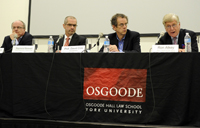Spurred by the mounting evidence of shifting attitudes towards the practice of torture and a highly critical United Nations report of government actions, the Jack and Mae Nathanson Centre on Transnational Human Rights, Crime & Security at Osgoode Hall Law School hosted a special forum on the subject Jan. 9.
Panellists participating in the forum, Evidence of Torture in Canada: The New Normal of Official Complicity, provided a diverse array of expert opinions from a variety of fields spanning academia, legal practice, intelligence and security, journalism and federal politics.
 From left, Professor Kent Roach of the University of Toronto; Raymond Boisvert, former assistant director, Intelligence, CSIS; Professor David Cole of Georgetown University; Ron Atkey, adjunct professor at Osgoode and first chair of the Security Intelligence Review Committee (1985-1989)
From left, Professor Kent Roach of the University of Toronto; Raymond Boisvert, former assistant director, Intelligence, CSIS; Professor David Cole of Georgetown University; Ron Atkey, adjunct professor at Osgoode and first chair of the Security Intelligence Review Committee (1985-1989)
Participants agreed that following increasing domestic and international developments concerning torture, Canada had reached a crucial juncture in terms of its official stance on the practice. The forum sought to take stock of the current state of the torture question in Canada, provide a platform for public debate about the issue, and spur further discussion about its most pressing and problematic aspects.
“It is part of the mandate of the Nathanson Centre to ask and seek to address difficult questions about issues of human rights, crime and security by bringing experts in conversation with the public,” said Professor François Tanguay-Renaud, director of the centre. “Despite popular belief, the issue of complicity in torture is a very real and pressing one for Canadian officials to address, in light of many controversial policy decisions and governmental actions in the last few years.”
Three panels were convened to provide specific context. Titled, “Evidence of Torture in the Courts: The Immigration, Criminal, and Civil Contexts”, the first panel highlighted how Canadian courts have demonstrated reluctance to seriously engage in questions of torture and label actions that have occurred within Canada as such.
The day’s second panel, titled, “Evidence of Torture and Executive Action: The CSIS, RCMP, and CBSA Issues” provided shared experience from the American context and moved the debate further towards the international sphere. Participants discussed the important topic of information sharing with foreign governments and the resulting human rights implications, in light of concerning aspects of new Ministerial Directives to Canadian intelligence and law enforcement agencies.
“Evidence of Torture and Armed Conflicts: Afghan Detainees and Other Cases”, the third panel, concluded the forum’s discussions by considering the current Canadian Government’s unwillingness to disclose information regarding the transfer of detainees in Afghanistan, and other examples of torture at the hands of Canadian troops.
Overall, the event highlighted and advanced discussion of the relationship between ensuring security and protecting human rights while rooting the question of torture and surrounding debates within a Canadian context.
This was the third forum held at the Nathanson Centre in the span of five years scrutinizing issues related to Canadian involvement with torture, after its 2007 series on Maher Arar’s rendition to torture in Syria and its 2010 forum on the transfer by Canadian troops of Afghan detainees to Afghan custody, with the possible knowledge that they may be tortured.


